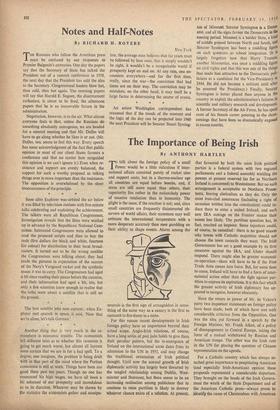The Importance of Being Irish
By ANTHONY HARTLEY To talk about the foreign policy of a small Power would be a little ridiculous if inter- national affairs consisted purely of rocket sites and support costs; but in a thermo-nuclear age all countries are equal before bombs, and, if some are still more equal than others, their superiority lies rather in the melancholy power of massive retaliation than in immunity. The plight is the same, if the reaction is not; and, since small countries are frequently disinterested ob- servers of world affairs, their statesmen may well estimate the international temperature with a more desperate accuracy than men gambling on their ability to shape events. Alarm among the neutrals is the first sign of armageddon in some- thing of the same way as a canary is the first to succumb to fire-damp in a mine.
For this reason recent developments in Irish foreign policy have an importance beyond their actual scope. Anglo-Irish relations, of course, have a long series of past judo holds to give them their peculiar pattern, but the re-emergence of Ireland on the international scene dates from its admission to the UN in 1955, and may change the traditional orientation of Irish political thought. Until now the normal growth of Irish diplomatic activity has largely been thwarted by the tangled relationship among Dublin, West- minster, and Stormont, but there seems to be an increasing realisation among politicians that to continue to raise partition is likely to destroy whatever chance exists of a solution. At present, that favoured by both the main Irish political parties is a federal system with two regional parliaments and a federal assembly wielding the powers at present reserved (as far as Northern Ireland is concerned) to Westminster. But no such arrangement is acceptable to Northern Protes- tants, fearing clericalism as they do. Only the most iron-clad assurances (including a right of secession written into the constitution) could in- duce them to enter a united Ireland, and each new IRA outrage on the frontier makes their assent less likely. The partition question has, in fact, reached an impasse. Some injustices could, of course, be remedied : there is no good reason why towns with Catholic majorities should not choose the town councils they want. The Irish Government has set a good example by its firm measures against the IRA, and Ulster should respond. There might also be greater economic co-operation—there will have to be if the Free Trade Area comes into force. But, for some time to come, Ireland will have to find a form of inter- national action other than the fight against par- tition to express its aspirations. It is this fact which the greater activity of Irish diplomacy has ap- peared to recognise, however obscurely.
Since the return to power of Mr. de Valera's party two important statements on foreign policy have been made, both of which have met with considerable criticism from the Opposition. One was the idea put forward in a speech by the Foreign Minister, Mr. Frank Aiken, of a policy of disengagement in Central Europe, taking the form of a mutual withdrawal by Russian and American troops. The other was the Irish vote in the UN for placing the question of Chinese representation on the agenda.
For a Catholic country which has always at- tached great importance to propitiating American (and especially Irish-American) opinion these proposals represented a considerable departure. They brought on the heads of the Irish Govern- ment the wrath of the State Department and of the American Catholic press—always prone to identify the cause of Christendom with American interests. However, looked at as proceeding from country whose policy had always been pro- claimed as neutrality, there was nothing illogical about them. In the first case, Mr. Aiken's sug- gestion was made in the context of an effort to relieve the lot of the Catholic countries of Poland and Hungary. In the second, he might have Pointed to the recognition of Communist China by Britain, America's ally, as well as to the un- doubted fact that diplomatic recognition has nothing to do with ethical approval. This reason- ing, however, passed unnoticed both by the State Department and by the Opposition in the Dail.
What is interesting about these developments Is that a' country like Ireland, with the strongest bias against Communism should feel the need for some relaxation of international tension With such force that its diplomacy is willing to strike out on its own. It is significant that this activity in Irish foreign policy should have arisen at a moment when intercontinental missiles were making, the old negative conception of neutrality obsolete. A positive neutrality implies a definite effort to avert a war in which all—neutrals as well as combatants—would be overwhelmed, and there must be many nations in Western Europe in or out of NATO who would applaud this pre- occupation. The Irish evolution is symptomatic, and it is a symptom which bodes ill for the Dulles view of American policy in Europe. For Ireland itself this positive neutrality also means an attempt to rise above the old riddles set by history. The question of partition may one day be solved in the UN—one day —but for the minute it is certainly being transcended there. A more active Irish foreign policy means an end to isolation and an acquaintance with world problems which can only do good. Great Britain should welcome these intelligent efforts to get away from the monotonous clashing of the two world blocks. Ireland now seems likely to take its place as one of the small band of disinterested countries whose influence is out of proportion to their size and to whose good example such suc- cess as present international organisations enjoy is due.































 Previous page
Previous page